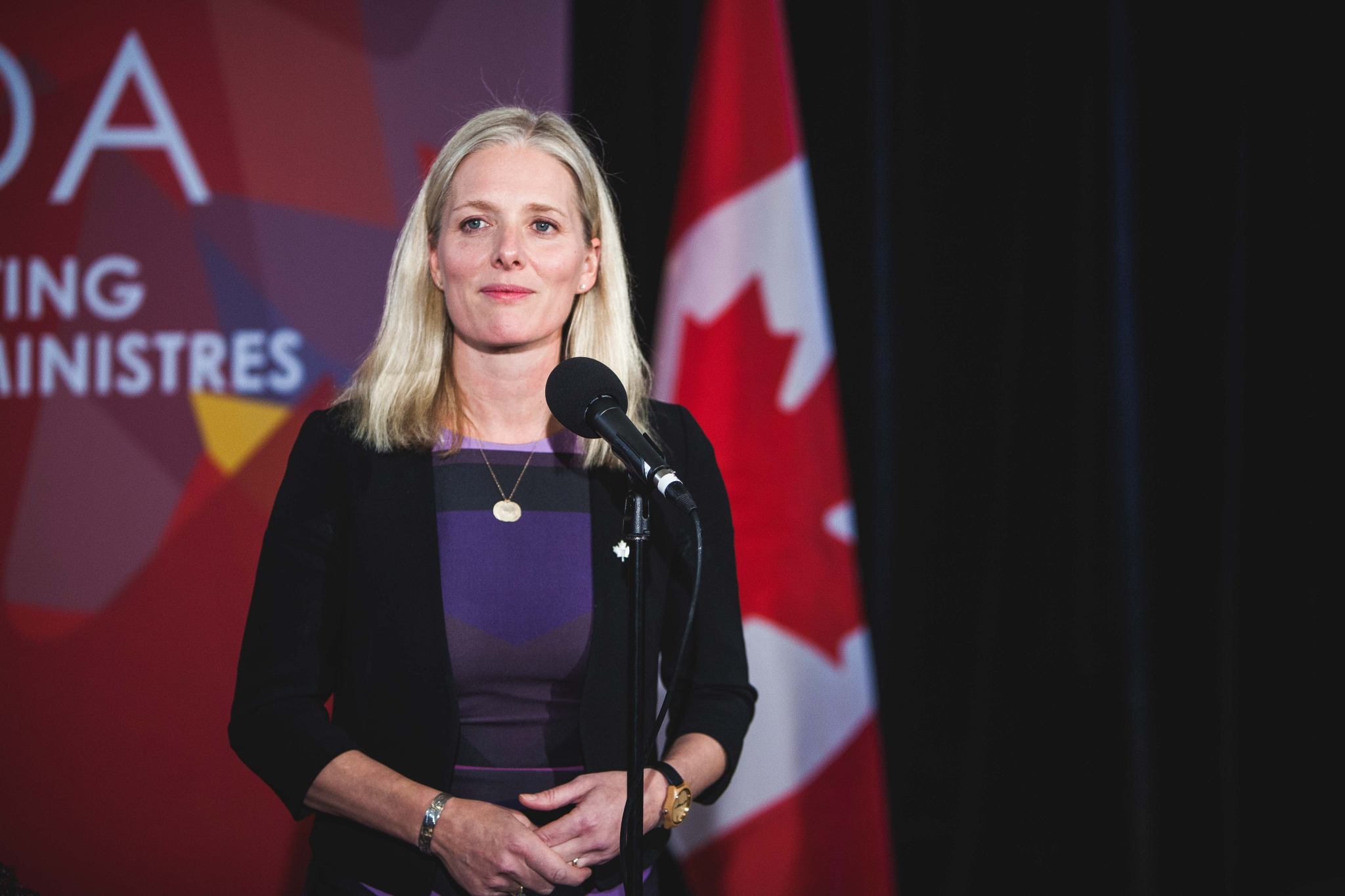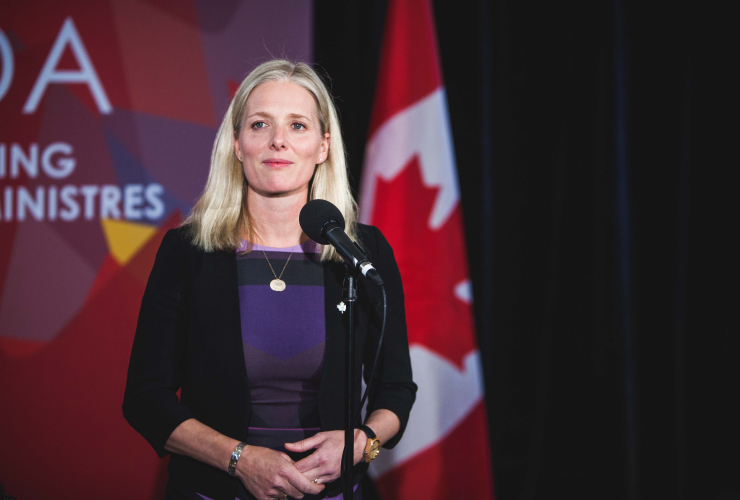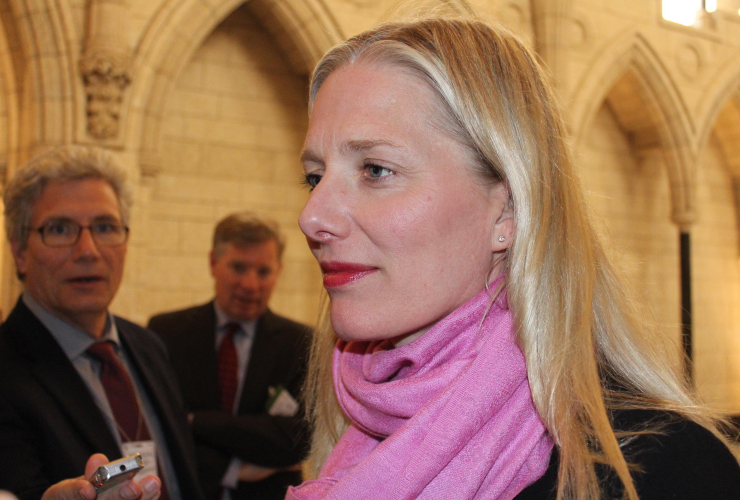As the White House took a step toward undoing tough pollution standards on gas guzzling vehicles, Canada's environment minister said that the Trudeau government was increasingly looking to partner with China on climate change action and clean economy opportunities.
Speaking in Washington on Wednesday, Catherine McKenna said China has been “very active in terms of climate negotiations, playing a positive role,” and said that Canada will work with China on international climate change negotiations.
“Climate change is a big challenge and it’s not going to be solved by Canada. That is for sure. We are going to do our part … but we need to be working with all partners,” McKenna said in a talk on climate change at the Center for Strategic and International Studies, a public policy research organization.
Canada can also help the country to put together solutions to air, water and soil pollution – an issue that McKenna said was a hot topic of discussion when she travelled to China as part of a Canadian government delegation in December 2016.
“China needs it. China is taking climate action because they see an opportunity to play a leadership role, but they are also taking climate action because people can’t breathe,” McKenna said, noting the country’s severe air pollution – which recently led a group of Chinese lawyers to launch a lawsuit against the government on behalf of citizens choking on the country’s often-toxic air.
Day 1 in cold D.C. I'm talking climate, energy & Great Lakes w @WhiteHouse, Congress, business & mayors, @CSIS chat, #GreatLakesDays event. pic.twitter.com/TRg784Vl9F
— Catherine McKenna (@cathmckenna) March 15, 2017
McKenna said she was “still hopeful” that the U.S. will remain in the 2015 Paris Agreement on climate change. Reports on Wednesday suggested that U.S. President Donald Trump has been talking about the Paris agreement with some U.S. oil companies, some of which – including Exxon Mobil – have supported the deal. Signs that Trump is asking for their input could mean that the president is wavering on his election promise to pull the U.S. out of the agreement.
But Trump also announced on Wednesday that the government would review of emission standards for automobiles. This could result in a repeal of rules that have forced American-made vehicles to become increasingly efficient.
Greenpeace climate campaigner Keith Stewart described the move as “smugly selling out Americans’ future to boost gas sales.” The Heartland Institute, an oil-industry-funded think tank, greeted the announcement enthusiastically. “So much winning, I think I’ll take my truck for a spin to celebrate," Heartland Institute energy policy research fellow Bette Grande said in a statement.
Trump's move comes after an analysis by Bloomberg predicted a dramatic rise in electric vehicles that could soon transform markets and cause the next oil crisis.
Trump, who said during the campaign that climate change is a myth invented by China, also announced last week that he planned to slash the budget of the Environmental Protection Agency and eliminate climate change programs. Scott Pruitt, his pick to lead the EPA, is a vocal climate change denier.

McKenna said she had a “good conversation” with Pruitt after he was nominated, and that they found common ground in their shared interests in “clean air, clean water, the Great Lakes, clean energy innovation."
She said Canada would still look for opportunities to cooperate with the U.S.: “I will make the economic case for clean energy innovation, because I think that … no matter what your perspective is on climate, there is an economic opportunity.”
Catherine McKenna says Canada prepared to work with all partners on climate change
But as the world waits to see how an American retreat on climate change action could affect the global fight, McKenna said Canada will work with anyone who is serious about climate action.
McKenna also noted that China will launch the world’s largest cap-and-trade carbon market this year.
Any domestic moves in China have the potential for a huge global effect: research from the New Climate Institute commissioned by the Climate Action Network ahead of the 2015 Paris talks suggests that the country’s national climate plan will save 75 people per million in China from dying of pollution-related illnesses every year.
McKenna also said on Wednesday that Canada is hoping to encourage private sector investment in renewable energy and clean tech, and to make an economic argument for reducing emissions or energy use.
“Because the challenge is so big, but also because the rewards are potentially so big, you’re going to see the private sector playing a bigger role,” she said. Despite Canada’s commitment in Paris in 2015 to spend $2.65 billion to fight climate change, McKenna said that the private sector will have step up: “The reality is we need trillions of dollars, so of course the private sector has to be a part of this,” she said.
Key to that will be smart, long-term planning on climate policy, she said. “It’s not one election cycle. (Businesses) are investing for the future, so they need to know what the plan is so they can make smart decisions.”
Well, Catherine, you say
Well, Catherine, you say "Canada will work with anyone who is serious about climate action." If that isn't the ultimate in hypocricy! If you are now serious about your Paris promises you'd better start with working with our own country, Canada. Your government has just proved they don't mean what they say by passing Kinder Morgan, Line 3, LNG on the west coast, the reactivation of the tar sands, the dirtiest fossil fuel site on the planet, continuation of fossil fuel subsidies etc., etc, etc.. No rational nation on earth which is truly serious about fighting climate change can do anything more than dismiss our Trudeau government to the waste bin of climate change allies. The rapidly deteriorating world pollution situation is emphatically stating that Canada can't have it both ways. Despite your fantasies about meeting climate commitments at the same time as you support the fossilizing industries in the name of profit it doesn't work that way. Now you're going to ride on the Chinese coattails instead of following the American lead in showing the world how a thoughtful and far sighted first world nation can be at the head of the pack. You blew your chances with me regarding the reelection you look forward to. Your sellout to the fossil money merchants is almost complete. Give me a government that will tell us bluntly we can't have it both ways when island and coastal nations disappear under rising waters, reefs lie bleaching, our reservoirs of water in the form of glaciers disappear before our eyes, people die of air and water pollution - - -. And so endeth my deeply believed rant.
It is really sickening to
It is really sickening to watch the choreographed spin machine in action. After approving enough pipeline and LNG projects recently to entirely destroy not only Canada's commitment to COP20, but make Canada by far the world's BIGGEST emitter, they now draw the eyes of the world to China. The timing is suspect, since Trudeau has had a number of private pay-for-play dinners with Chinese businessmen and has made some remarkably propitious decisions for some of the attendees afterwards. China is being wooed as trading partners and being allowed to buy a number of companies, despite grave concerns raised and awful track records, this includes a large senior's care company. The well-documented human rights violations, invasion and continued genocide in Tibet, building islands in the territory of other countries in the South China Sea and loading them with weaponry, to name just a few, don't even rate a mention by our government, never mind a pause for consideration. They are not on an altruistic volunteer project to assist China, they are on trade missions trying to sell the world's most polluting energy - LNG, and whatever else they can offload. In return they are allowing China to buy up Canada, sending their own workers to run companies and build their projects with their own materials. Look at their partnerships in Africa for our future. Big projects using mostly Chinese labour, paying low Chinese wages with 14 hour days, 7 days a week.
We can blame (with reason)
We can blame (with reason) governments lack of action and oil companies pushing for more oil production, but ultimately it's consumers decisions that allow GHG emissions from the transportation sector to go up instead of going down. The largest source of transportation emissions in North America comes from passenger transportation. In Canada, passenger transportation accounted for 55% of total GHG emissions from the transportation sector in 2014, or 95 Mt (171 Mt for the entire sector, or 23% of total Canadian GHG emissions). The growing emissions is principally due to the growing trend of consumer preference for SUV's and light trucks (e.g.:consumers are bombarded by publicity for pickup trucks) which have more than double since 1990, going from 22 Mt in 1990 to more than 50 Mt in 2014. The consumer preference for these "gas guzzling" vehicles have more than offset reductions in passenger car emissions (due to improved fuel economy and emissions standards) from 52 Mt in 1990 to 36 Mt in 2014.
Emissions from freight transportation have also significantly grown since the 1990, going from 24 Mt in 1990 to 55 Mt in 2104. Moving freight by truck has increased in recent decades as a result of increasing consumer demand for manufactured goods, just-in-time production models, and door-to-door delivery to consumers.
(source: National Energy Board, July 14, 2016, Market Snapshot: "Increased GHG emissions from the transportation sector reflect major consumer and business trends")






Comments